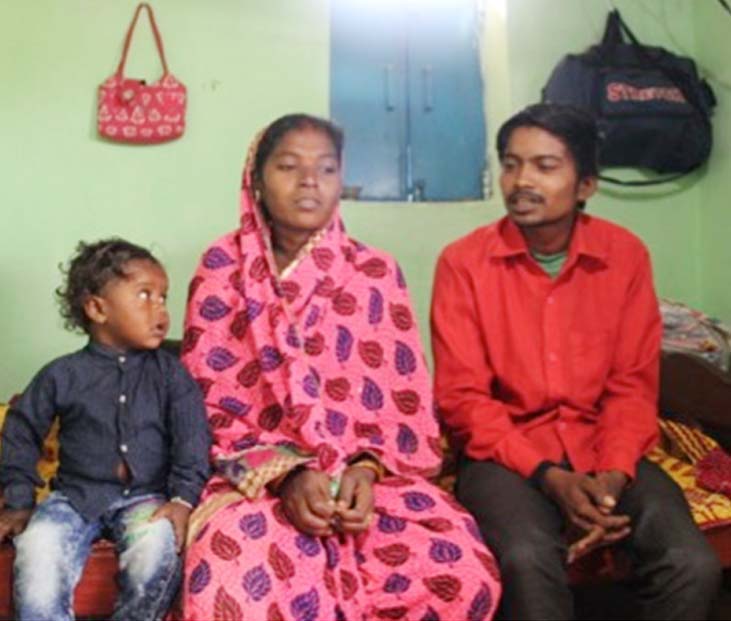HEALTH
“Think about it, I have one child and I spent Rs.40 – Rs 50 on his needs daily. If I have five children, I will still have Rs 40-50 to spend on them. The children will have to snatch and fight over food. How does it make sense?” says Aakash, a participant of ZLPP pilot.
The health, social and economic benefits of family planning have dawned on him and today he considers it as his social responsibility to advocate about the benefits of family planning. Tarun, the CARE India facilitator applauds Aakash’s efforts “We show him as an example, to motivate others you need to show them something they can’t ignore. We share his story and understand the change that Aakash had gone through.
On using male privilege responsibly
Tarun, a CARE India facilitator, who started working in this project in November 2018 recounts his challenging task at hand. In a village where more than 50% of males are migrant laborers, knowledge dissemination takes place through monthly husband group meetings, home visits, and phone calls.


“When I started working here, these people used to believe children can’t be controlled, it’s a God’s wish. The average age of first-time mothers is 14-15 and fathers are 18-19. We faced various challenges in simply meeting them. Talking and explaining the problems of early pregnancy, miscarriage, the danger of premature or underweight children was difficult. We had to urge them in the village and realize the adverse consequences. Many children born in this village are underweight, unhealthy. Many have been kept in incubators. Slowly, some villagers have understood what we are trying to tell them, and we’ve finally built a good rapport.”
Aakash, 22, a native of Gangi village in Dobhi block of Gaya is one such example. He works at a hotel in a nearby district. Aakash is not only an early adopter but a staunch advocate of the ZLPP.
“We moved to this village after our first child, only then we learnt of modern contraceptives and family planning methods through the village ASHA and Tarun sir. I have actively participated in the discussions of family planning and explained about the benefits of family planning and use of modern contraceptives. Some people laughed at me, some even shut doors on my face when I accompanied Tarun Sir for home visits. “
The social burden of “Baccha Nahi Hua” (Being Childless)
Aakash considers family planning important, as he feel there is an irrational pressure to have children as soon as one gets married. He recounts the taunts he and his wife received before their first child; “Bacha nahi hua Baccha nahi hua” (Why are you still childless) we used to get to hear this a lot. 8-9 months into marriage we’d hear all kinds of things from the family and neighbours. We were staying with my mother then. She had a pet dog that my wife used to feed. One day, the neighbour threw a taunt at her “Will you keep mothering the dog or have a child of your own”. Thankfully, a couple of weeks later, we realized that we were expecting.
Tarun stresses on the pressure put by relatives on newly-weds to have a child as soon as after marriage. He says “The prevailing mentality here is if you are having kids, have them all in one go. Aakash’s mother was ailing. She was keen that she sees as many grandchildren as she can ”.
The struggles of talking about family planning
Getting men to pay attention to family planning advice has been extremely challenging. Tarun says “The turnout at the first few husband group meetings used to be dismal. We had to put great efforts to make people sit through these meetings. They used to walk away from the meeting before it was over. With the help of the Sarpanch and PRIs, we managed to get a few men to attend these meetings. We realized they were uncomfortable discussing such issues in public.” The fear of being mocked made males hesitant about participating in these meetings. Many of them ignored Tarun’s advice as they considered it irrelevant. Therefore, meetings were followed up with home visits and phone calls. In this manner, individual concerns are dealt with thorough attention and privacy.
Tarun adds, convincing Aakash was relatively easy as he was keen on delaying his wife’s second pregnancy but wasn’t aware of family planning. However, persuading Aakash to adopt family planning methods was no easy task. It required different tactics, namely financial burden and concern for mother’s health. When we first spoke to them, there was pressure to have as many children while Aakash’s mother was alive. We advised them to think as it would risk the mother’s health, because she had a caesarean. Then there is the fear of the child’s condition being unstable that might lead to unnecessary expenditure.
Breaking Resistance, Building Relevance
Tarun says “With our constant engagement, young women in the village are encouraged to delay the first pregnancy as many have witnessed the toll it takes on the mother.
The two-pronged awareness strategy that entails the village ASHA and CARE India facilitator to sustain a dialogue with husband and wife respectively has led to a better understanding of the problems at hand. Influencing Shri Chand, 26, a migrant labour and his wife is one such example. The wife had suffered miscarriages in the past and had been advised by the ASHA on family planning methods. From the beginning, Shri Charan was sceptical and evaded Tarun’s advice. He even fought with his wife for listening to ASHA’s advice.
However, after regular interactions and counselling with Tarun, Shri Chand realized the benefits of family planning. Under Tarun’s guidance, Shri Chand today realizes the value of a healthier, smaller family as opposed to the socially preferred big family. He says “We had a miscarriage and feared trying anything out. Now that I am aware of family planning, it helps raise a healthy family that I can manage. I will plan my family according to my income. I hope people realize the problems of having too many children”
Aakash echoes Shri Charan’s sentiments and considers it is his social responsibility to advocate family planning and get the community to benefit. He states from my experience, I can say I earn enough to take care of one child. It is a common sight to find that one child can barely walk, and the mother is already expecting. People laugh at me for having a 2-year-old and not planning another. I do plan to have another child when my son is 3-4 years old. Two children, that’s it. I don’t care if it’s a boy or a girl.


A person like Aakash setting a credible example to validate CARE India’s initiatives, feels Tarun, “Aakash has been incredibly supportive. Ever since we started interacting, it is not only his thinking but also his behavior and attitude have changed. His mother-in –law wanted her daughter to have many children soon, so he stood up against it and it led to a huge fight. He is a good example as he firmly believes in family planning . We show him as an example, to motivate others you need to show them something they can’t ignore. We share his story and they see the truth. Till they have faith, how will they be convinced? If people are adopting something new and are benefiting from it, then it makes our job easier. It is an added advantage that it becomes a bonus to have community members as advocates.”
Additionally, this project has instilled a new-found trust in government facilities in an area where private clinics and Rural Health Practitioners are largely preferred “It’s common for rural practitioners to do deliveries at home or they send their cars to pick up the patients. Sterilization isn’t even considered. They don’t think about the risk of infection and the mentality is such that Ghar mein sab kuch ho jayega. In their words, Sarkari doctors won’t come home for health check-ups. However, we are there to provide them day-to-day advice about health, provide contraceptives, check their health” says Tarun.
Tarun considers his persuasion of Aakash and Shri Charan as personal success stories. Both belong to communities highly averse to the idea of family planning. Aakash is a MahaDalit while Shri Charan belongs to the Manjhi community. In these communities, education levels are low and are resistant to change.
Tarun takes immense pride in his work as he could successfully bring positive change in these two men about family planning.
About the Program: CARE India’s Zero and Low Parity Pilot (ZLPP) strives to increase the uptake of modern contraceptives to delay the first pregnancy and subsequent spacing of birth. While the aim is to empower women’s role in family planning, the decision to plan or prevent pregnancies usually resides with the male. However, the pressure of archaic societal beliefs has chiefly influenced the decision-making of pregnancy for long. Today, few men choose to take care of one or two children, instead of following the societal desire of having many children. With increased concern about the wife’s and child’s well-being, men today are standing up for safe and planned pregnancies.





